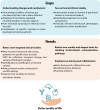The microbiota-gut-brain axis: pathways to better brain health. Perspectives on what we know, what we need to investigate and how to put knowledge into practice
- PMID: 35044528
- PMCID: PMC8770392
- DOI: 10.1007/s00018-021-04060-w
The microbiota-gut-brain axis: pathways to better brain health. Perspectives on what we know, what we need to investigate and how to put knowledge into practice
Abstract
The gut and brain link via various metabolic and signalling pathways, each with the potential to influence mental, brain and cognitive health. Over the past decade, the involvement of the gut microbiota in gut-brain communication has become the focus of increased scientific interest, establishing the microbiota-gut-brain axis as a field of research. There is a growing number of association studies exploring the gut microbiota's possible role in memory, learning, anxiety, stress, neurodevelopmental and neurodegenerative disorders. Consequently, attention is now turning to how the microbiota can become the target of nutritional and therapeutic strategies for improved brain health and well-being. However, while such strategies that target the gut microbiota to influence brain health and function are currently under development with varying levels of success, still very little is yet known about the triggers and mechanisms underlying the gut microbiota's apparent influence on cognitive or brain function and most evidence comes from pre-clinical studies rather than well controlled clinical trials/investigations. Filling the knowledge gaps requires establishing a standardised methodology for human studies, including strong guidance for specific focus areas of the microbiota-gut-brain axis, the need for more extensive biological sample analyses, and identification of relevant biomarkers. Other urgent requirements are new advanced models for in vitro and in vivo studies of relevant mechanisms, and a greater focus on omics technologies with supporting bioinformatics resources (training, tools) to efficiently translate study findings, as well as the identification of relevant targets in study populations. The key to building a validated evidence base rely on increasing knowledge sharing and multi-disciplinary collaborations, along with continued public-private funding support. This will allow microbiota-gut-brain axis research to move to its next phase so we can identify realistic opportunities to modulate the microbiota for better brain health.
Keywords: Ageing; Cognitive performance; Inflammation; Mental health; Microbiome; Nutrition.
© 2022. The Author(s).
Conflict of interest statement
The following authors: LG, LH, PI, ADK, MM, CS, DV declare that they have no competing interests. AC, GLF, EP, BP are employees of the food industry, as declared under affiliation.
Figures
References
Publication types
MeSH terms
LinkOut - more resources
Full Text Sources
Miscellaneous


